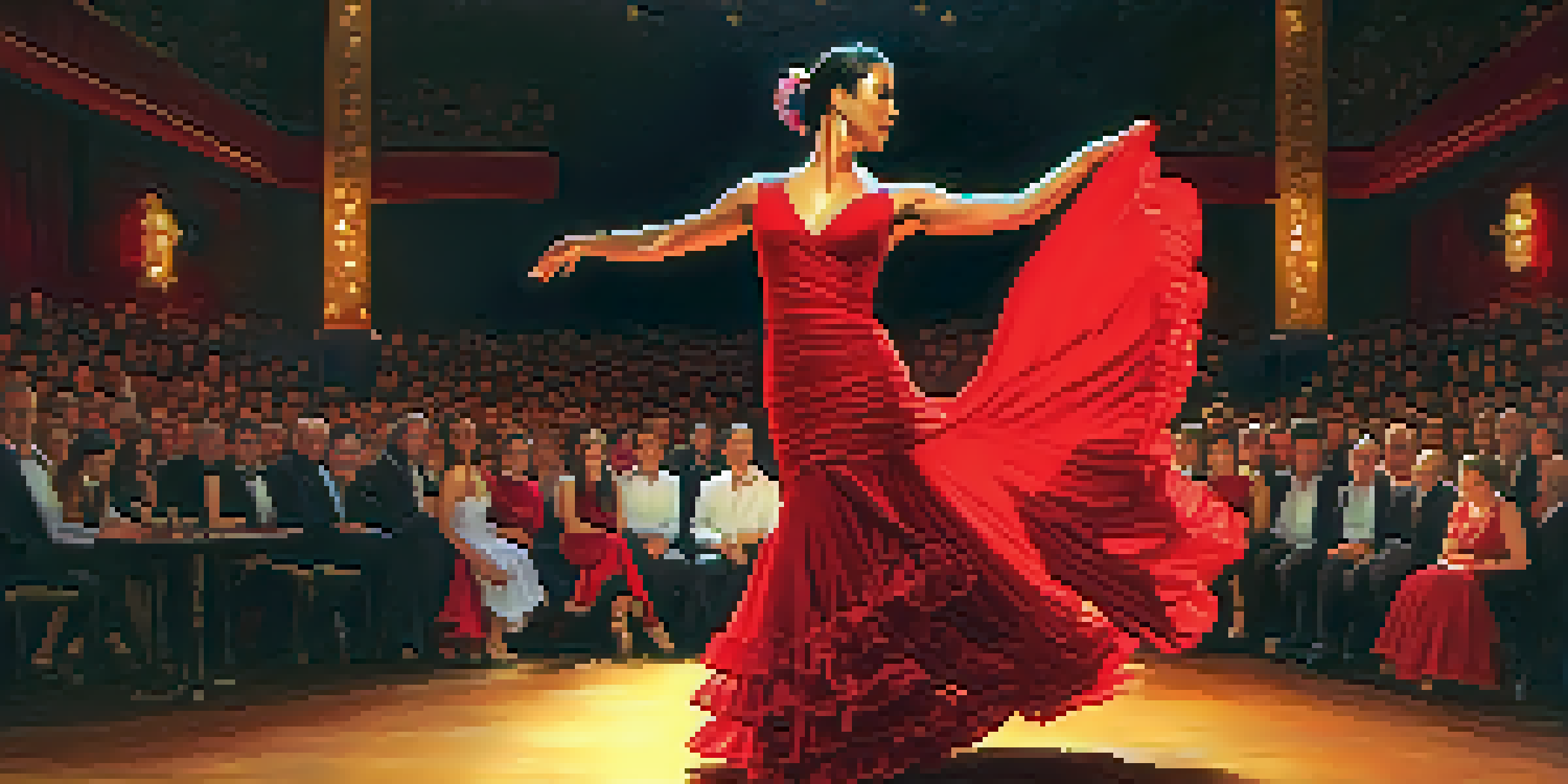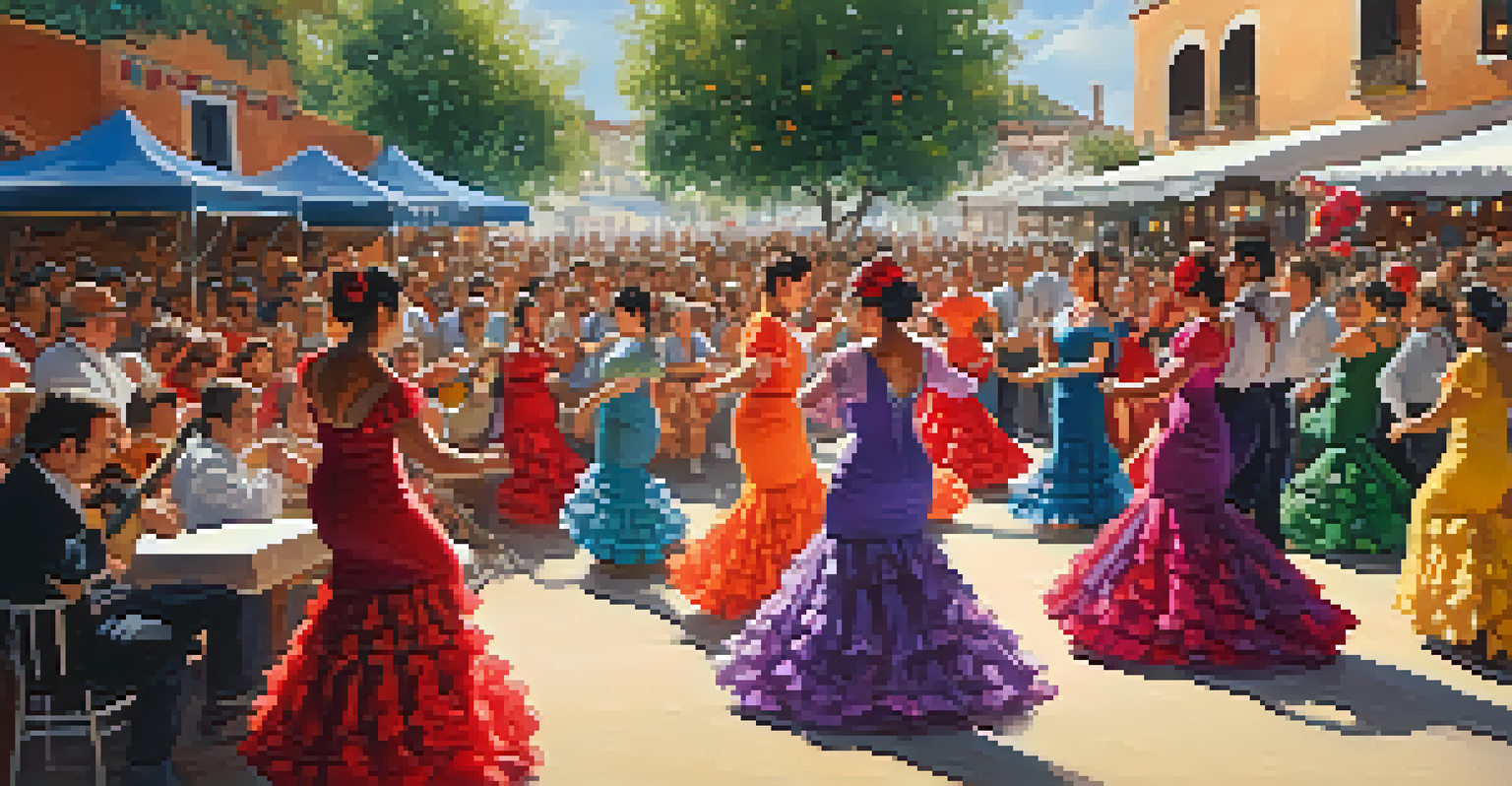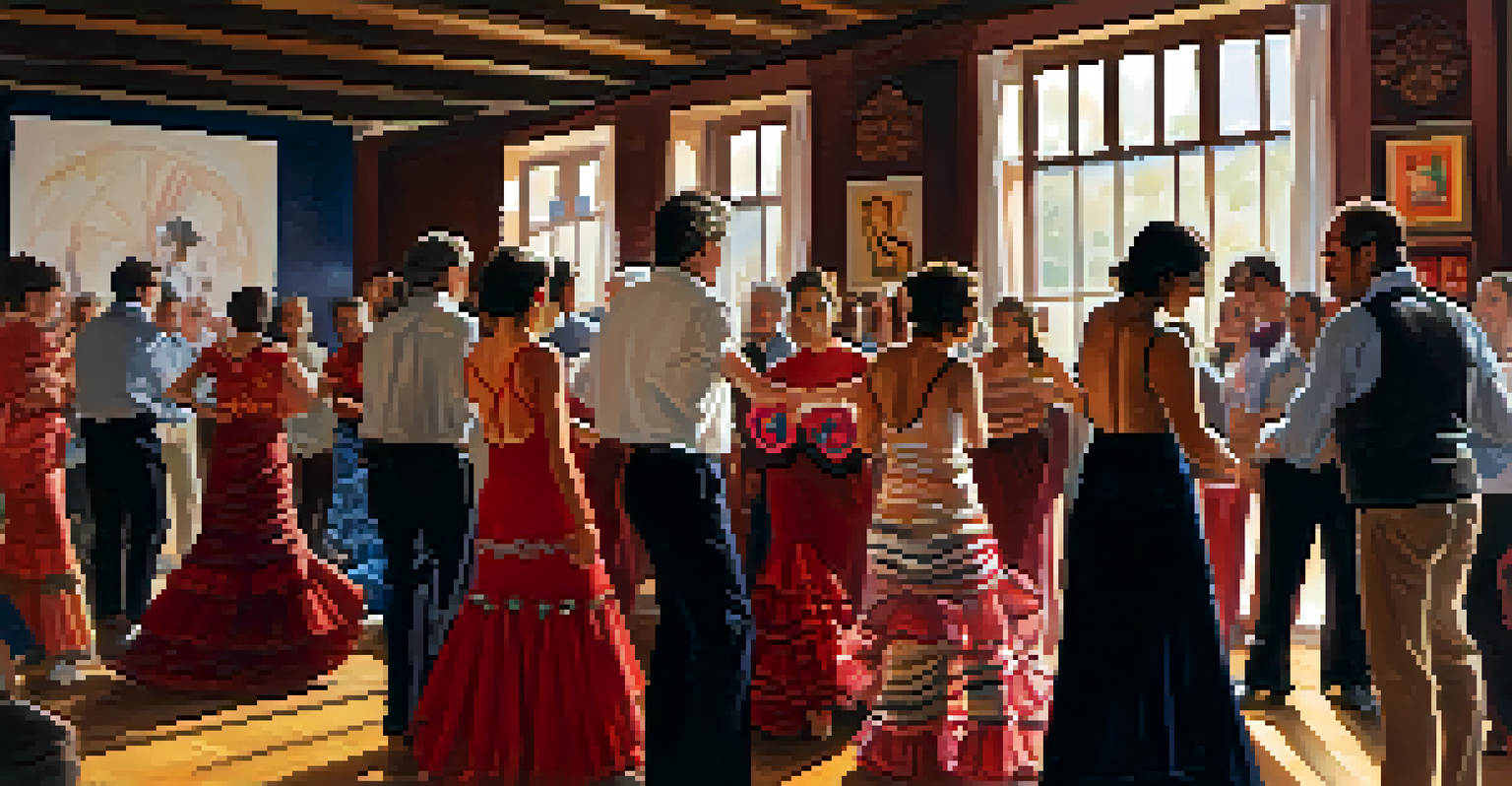The Significance of Flamenco Festivals in Spain

Flamenco: A Vibrant Expression of Spanish Culture
Flamenco is more than just a dance; it's a passionate expression of Spanish culture, particularly from the Andalusian region. With its roots tracing back to the 18th century, flamenco combines singing, guitar playing, and intricate footwork to tell stories of love, struggle, and resilience. Each movement and note resonates with the deep emotions of the performers, captivating audiences worldwide.
Flamenco is the expression of the soul of the Andalusian people.
At flamenco festivals, this rich tradition comes alive, showcasing the diverse styles and regional variations of flamenco. From the soulful 'soleá' to the upbeat 'alegrías,' each performance offers a glimpse into the heart and soul of Spain. These festivals serve as a gathering place for artists and enthusiasts alike, creating a vibrant community centered around this art form.
Moreover, flamenco festivals often highlight the cultural significance of this dance, emphasizing its role in preserving history and identity. Attendees not only enjoy performances but also learn about the origins and evolution of flamenco, fostering a deeper appreciation for this beautiful tradition.
The Role of Flamenco Festivals in Cultural Preservation
Flamenco festivals play a crucial role in preserving the cultural heritage of Spain. These events provide a platform for established artists and emerging talent to showcase their skills, ensuring that the art form continues to thrive. By celebrating flamenco publicly, festivals help to keep traditions alive for future generations.

Additionally, many festivals offer workshops and educational sessions, inviting attendees to engage with flamenco on a personal level. Participants can learn the basic steps, understand the music, or even try their hand at playing the guitar. This hands-on experience deepens their connection to the art form and encourages them to explore its rich cultural context.
Cultural Significance of Flamenco
Flamenco festivals are vital for preserving Spanish culture and history, showcasing diverse styles and educating attendees.
By promoting education and participation, flamenco festivals contribute significantly to cultural preservation efforts. They foster an environment where tradition meets innovation, allowing flamenco to evolve while remaining rooted in its historical significance.
Economic Impact of Flamenco Festivals on Local Communities
Flamenco festivals are not only cultural celebrations but also significant economic boosters for local communities. These events attract tourists from all over the world, generating revenue for hotels, restaurants, and local artisans. The influx of visitors creates job opportunities and stimulates the local economy, making flamenco festivals vital to community growth.
Art is not a mirror to reflect reality, but a hammer with which to shape it.
Moreover, the festivals often showcase local crafts and products, highlighting regional specialties. From handmade fans to traditional clothing, these markets provide artisans with a platform to sell their creations. This not only supports local businesses but also promotes the unique aspects of Andalusian culture.
In essence, flamenco festivals serve as a powerful reminder of the interconnectedness of art and economy. They create a vibrant atmosphere that encourages cultural exchange while benefiting the local community.
Community Bonding Through Flamenco Festivals
Flamenco festivals foster a sense of community among attendees, artists, and organizers alike. These events create an inviting atmosphere where people from all walks of life can come together to celebrate a shared passion for flamenco. This sense of unity is palpable in the way audiences respond to performances, often breaking into spontaneous applause and cheers.
Many festivals include communal activities, such as group dances or sing-alongs, further enhancing the bonding experience. Participants find joy in learning and performing together, breaking down barriers and building friendships. These moments of connection reinforce the idea that flamenco is not just an individual expression but a communal one.
Economic Boost from Festivals
These events stimulate local economies by attracting tourists and promoting regional crafts, benefiting communities financially.
Through these shared experiences, flamenco festivals create lasting memories and relationships, strengthening the cultural fabric of the community. They remind us that art has the power to connect people, transcending language and cultural differences.
Flamenco Festivals as a Platform for Social Issues
In addition to celebrating tradition, flamenco festivals often address contemporary social issues. Artists use their performances as a medium to highlight topics such as inequality, migration, and cultural identity. This blend of art and activism empowers performers to share their perspectives and encourages audiences to engage in meaningful conversations.
For instance, some festivals incorporate discussions and panels featuring artists, scholars, and activists. These dialogues provide a space for critical examination of societal challenges, promoting awareness and understanding among attendees. By addressing these topics, flamenco festivals become catalysts for social change.
Ultimately, the incorporation of social issues into flamenco performances enriches the festival experience. It transforms entertainment into a powerful platform for dialogue, fostering a deeper connection between the audience and the art.
The Global Reach of Flamenco Festivals
Flamenco's influence has transcended borders, leading to the establishment of festivals worldwide. From Japan to Argentina, flamenco festivals celebrate this art form, allowing diverse audiences to experience its beauty. These international events not only showcase Spanish culture but also highlight the global appreciation for flamenco.
As flamenco spreads, it often adapts to local contexts, leading to unique interpretations and fusions. This evolution enriches the art form, allowing it to resonate with people from different cultures. Festivals become a melting pot of styles, where traditional flamenco meets contemporary influences, creating exciting new performances.
Flamenco's Global Reach
The international popularity of flamenco festivals highlights its universal appeal, allowing diverse audiences to engage with this art form.
The global reach of flamenco festivals underscores the universal appeal of this art form. It serves as a reminder that culture knows no boundaries and that the passion for flamenco can unite people from all corners of the world.
The Future of Flamenco Festivals: Embracing Change
As the world evolves, so too do flamenco festivals. Organizers are increasingly incorporating technology, such as live streaming and virtual workshops, to reach a broader audience. This adaptation ensures that flamenco remains accessible, allowing people from different parts of the world to participate and engage with the art form.
Additionally, festivals are beginning to include more diverse artists, reflecting the contemporary landscape of flamenco. By embracing innovation and inclusivity, these events not only preserve tradition but also encourage new interpretations and collaborations. This evolution ensures that flamenco continues to resonate with future generations.

Ultimately, the future of flamenco festivals looks bright. With a commitment to adaptation and inclusivity, these celebrations will continue to thrive, keeping the spirit of flamenco alive for years to come.